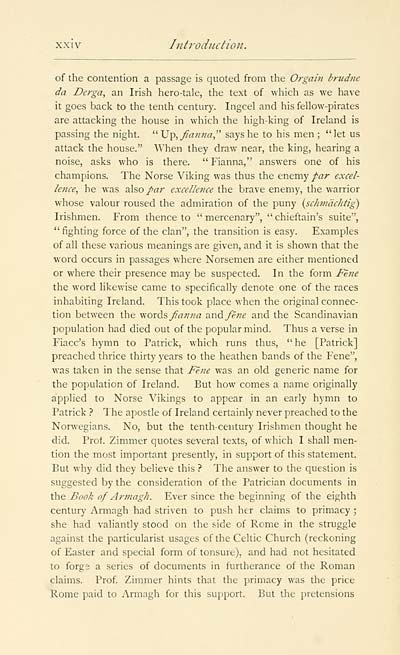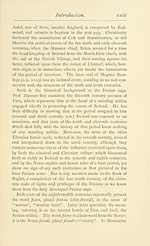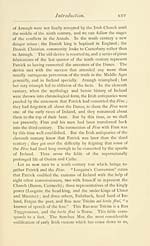Download files
Complete book:
Individual page:
Thumbnail gallery: Grid view | List view

Introduction.
of the contention a passage is quoted from the Orgain brudne
da Derga, an Irish hero-tale, the text of which as we have
it goes back to the tenth century. Ingcel and his fellow-pirates
are attacking the house in which the high-king of Ireland is
passing the night. " Up, yf« ;?««," says he to his men; "let us
attack the house." ^^'hen they draw near, the king, hearing a
noise, asks who is there. " Fianna," answers one of his
champions. The Norse Viking was thus the enemy /ar excet-
tence, he was also par excellence the brave enemy, the warrior
whose valour roused the admiration of the puny {schmdchtig)
Irishmen. From thence to "mercenary", "chieftain's suite",
"fighting force of the clan", the transition is easy. Examples
of all these various meanings are given, and it is shown that the
word occurs in passages where Norsemen are either mentioned
or where their presence may be suspected. In the form Fene
the word likewise came to specifically denote one of the races
inhabiting Ireland. This took place when the original connec-
tion between the viordsjianna and fene and the Scandinavian
population had died out of the popular mind. Thus a verse in
Fiacc's hymn to Patrick, which runs thus, "he [Patrick]
preached thrice thirty years to the heathen bands of the Fene",
was taken in the sense that Fetie was an old generic name for
the population of Ireland. But how comes a name originally
applied to Norse Vikings to appear in an early hymn to
Patrick ? The apostle of Ireland certainly never preached to the
Norwegians. No, but the tenth-century Irishmen thought he
did. Prof. Zimmer quotes several texts, of which I shall men-
tion the most important presently, in support of this statement.
But why did they believe this ? The answer to the question is
suggested by the consideration of the Patrician documents in
the Book of Armagh. Ever since the beginning of the eighth
century Armagh had striven to push her claims to primacy ;
she had valiantly stood on the side of Rome in the struggle
against the particularist usages of the Celtic Church (reckoning
of Easter and special form of tonsure), and had not hesitated
to forg3 a series of documents in furtherance of the Roman
claims. Prof Zimmer hints that the primacy was the price
Rome paid to Armagh for this support. But the pretensions
of the contention a passage is quoted from the Orgain brudne
da Derga, an Irish hero-tale, the text of which as we have
it goes back to the tenth century. Ingcel and his fellow-pirates
are attacking the house in which the high-king of Ireland is
passing the night. " Up, yf« ;?««," says he to his men; "let us
attack the house." ^^'hen they draw near, the king, hearing a
noise, asks who is there. " Fianna," answers one of his
champions. The Norse Viking was thus the enemy /ar excet-
tence, he was also par excellence the brave enemy, the warrior
whose valour roused the admiration of the puny {schmdchtig)
Irishmen. From thence to "mercenary", "chieftain's suite",
"fighting force of the clan", the transition is easy. Examples
of all these various meanings are given, and it is shown that the
word occurs in passages where Norsemen are either mentioned
or where their presence may be suspected. In the form Fene
the word likewise came to specifically denote one of the races
inhabiting Ireland. This took place when the original connec-
tion between the viordsjianna and fene and the Scandinavian
population had died out of the popular mind. Thus a verse in
Fiacc's hymn to Patrick, which runs thus, "he [Patrick]
preached thrice thirty years to the heathen bands of the Fene",
was taken in the sense that Fetie was an old generic name for
the population of Ireland. But how comes a name originally
applied to Norse Vikings to appear in an early hymn to
Patrick ? The apostle of Ireland certainly never preached to the
Norwegians. No, but the tenth-century Irishmen thought he
did. Prof. Zimmer quotes several texts, of which I shall men-
tion the most important presently, in support of this statement.
But why did they believe this ? The answer to the question is
suggested by the consideration of the Patrician documents in
the Book of Armagh. Ever since the beginning of the eighth
century Armagh had striven to push her claims to primacy ;
she had valiantly stood on the side of Rome in the struggle
against the particularist usages of the Celtic Church (reckoning
of Easter and special form of tonsure), and had not hesitated
to forg3 a series of documents in furtherance of the Roman
claims. Prof Zimmer hints that the primacy was the price
Rome paid to Armagh for this support. But the pretensions
Set display mode to: Large image | Transcription
Images and transcriptions on this page, including medium image downloads, may be used under the Creative Commons Attribution 4.0 International Licence unless otherwise stated. ![]()
| Early Gaelic Book Collections > Ossian Collection > Waifs and strays of Celtic tradition > Volume 4 > (30) |
|---|
| Permanent URL | https://digital.nls.uk/82446288 |
|---|
| Description | IV. The Fians, Gaelic & English. |
|---|---|
| Shelfmark | Oss.279 |
| Attribution and copyright: |
|
| Description | Selected books from the Ossian Collection of 327 volumes, originally assembled by J. Norman Methven of Perth. Different editions and translations of James MacPherson's epic poem 'Ossian', some with a map of the 'Kingdom of Connor'. Also secondary material relating to Ossianic poetry and the Ossian controversy. |
|---|
| Description | Selected items from five 'Special and Named Printed Collections'. Includes books in Gaelic and other Celtic languages, works about the Gaels, their languages, literature, culture and history. |
|---|

